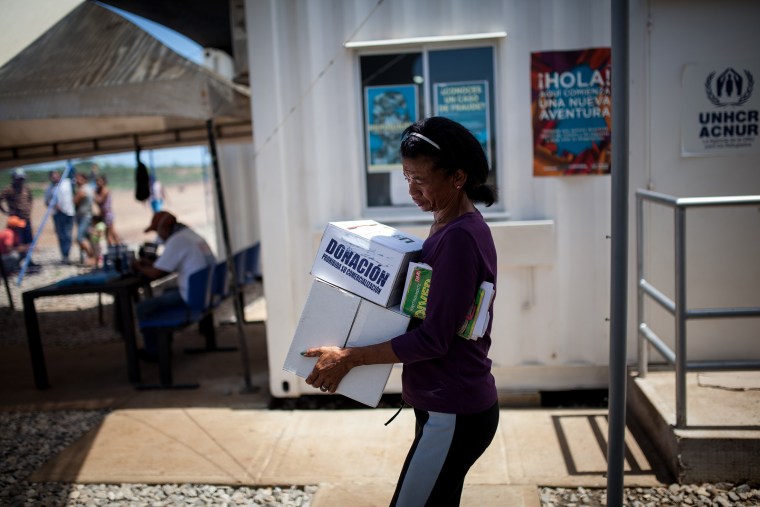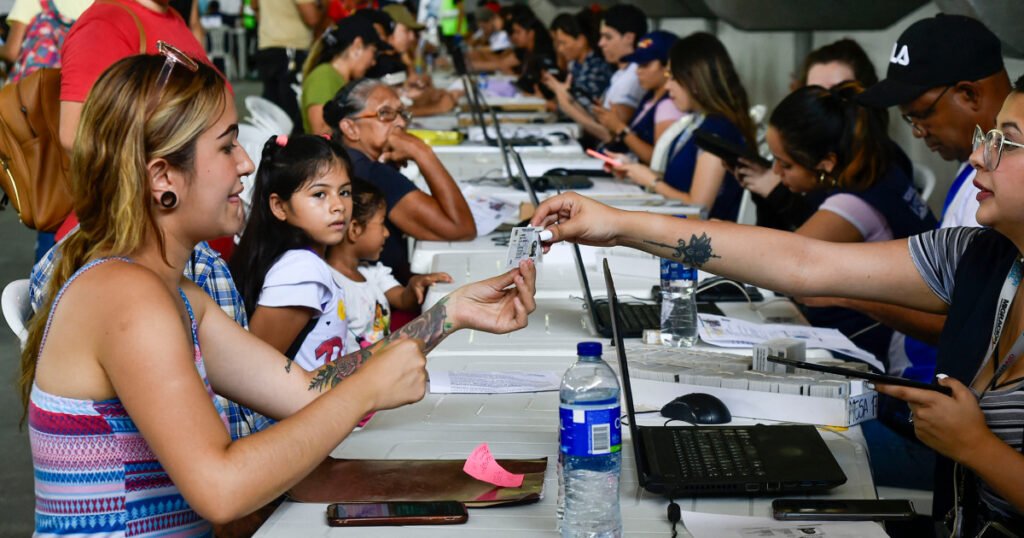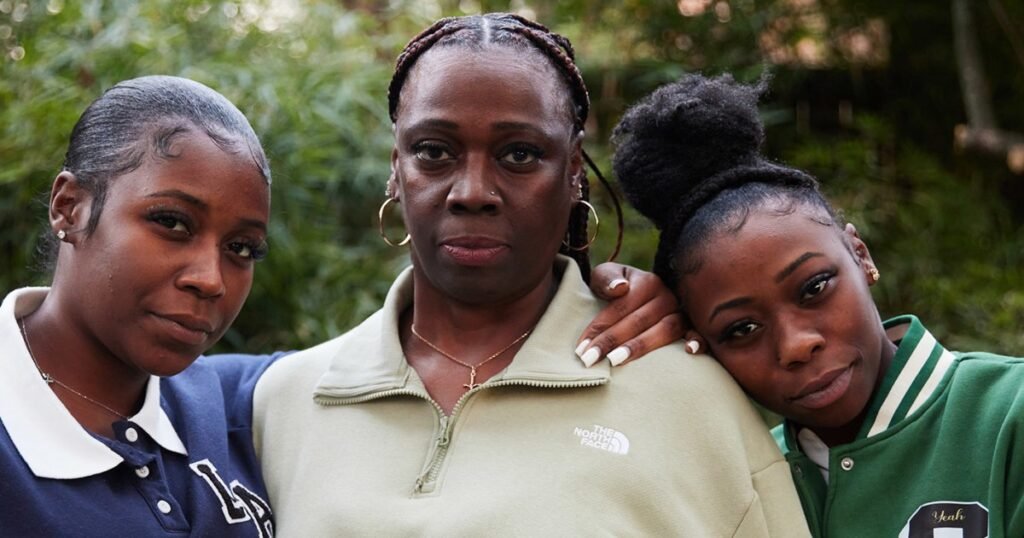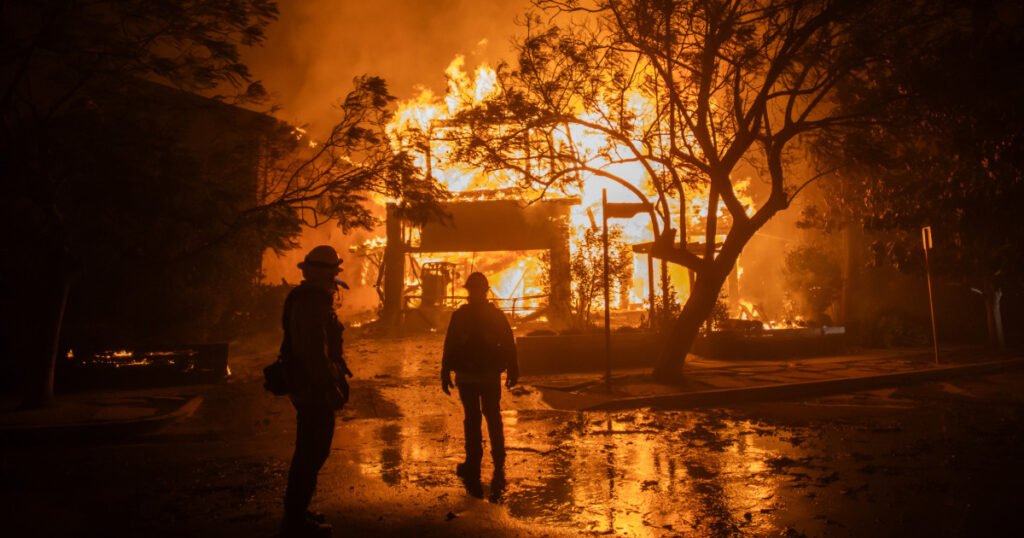In Colombia, a group with funds from the U.S. Agency for International Development helps employ Venezuelans who fled their country’s authoritarian regime and economic crisis.
In Haiti, another program that gets USAID money is ready to distribute millions of tons of bean seeds to farmers and tools for fishermen that would help sustain families amid the country’s widespread hunger, violence and instability.
Those programs along with others are part of the complex web of U.S. global assistance that addresses humanitarian needs and helps mitigate migration to the United States and other countries, by helping people become self-sustaining.
The Trump administration has excoriated USAID programs as fraught with waste and abuse as they’ve virtually dismantled the agency, with President Donald Trump on Friday calling for it to be “shut down.” But those who have worked with USAID programs say they’ve had a role in preventing some migration — and could help Trump accomplish his goals of slashing illegal entries into the U.S. and controlling the border.
“What drives migration is lack of opportunity, lack of health services, a decent quality of life and knowing you can have a better one in a different place,” said an official with knowledge of the USAID partnered program in Colombia that helps employ Venezuelans. He did not want to be identified for fear the program could be targeted.
On Friday, a federal judge ordered a temporary pause of the Trump administration’s planned administrative leave for thousands of USAID employees.
Most Venezuelan refugees have migrated to other countries in Latin America: As of November, Colombia had taken in the most at about 2.8 million, according to the Interagency Coordination Platform for Refugees and Migrants. By contrast, about 600,000 Venezuelans are in the U.S. under temporary protected status, which Trump is eliminating.
Migration is usually a product of many factors: economic downturns, political persecution, increased insecurity, violence perpetrated by criminal syndicates or domestic violence, along with a desire for better educational and economic opportunities, family ties and even love and marriage.
But Trump has added a new push factor by cutting off money to programs that may have helped people in other countries survive or overcome those factors, according to people who work with relief groups.
“We have no problem with people saying I want to review this program. I think it’s good and necessary,” said Gabriel Salguero, pastor of the National Latino Evangelical Coalition who has participated in humanitarian assistance programs in many countries.
But the lack of clarity and pause is putting people’s lives at stake, he said. Some of the programs provide direct cash payments, according to the official overseeing USAID-funded programs in Latin America.
Salguero said his group’s phone line has been flooded with calls from people in the U.S. who help support the faith-based nonprofits around the world.
“Historically poverty has contributed to migration. Poverty and hunger contribute. I go back to the book of Genesis, there was a famine and God had to lead Joseph … I don’t think Jesus was playing around when he said, ‘I was hungry and you gave me to eat,'” Salguero said.
Sustaining an ‘economic chain’ — and helping stem migration
Emily Chambers Sharpe, director of global health and communications for World Relief, a Christian humanitarian group that receives USAID funding, said the group has procured about 4.3 million tons of seeds for beans that were about to be distributed to farmers to be planted.
“If the farmers can plant those and get their crops, then they have food security; it’s not so tempting to move away,” Chambers Sharpe said.
She’s also met with fishermen in Haiti who “talked about how this assistance helps them prepare for hurricanes and cyclones that move through, and again, it helps keep people in Haiti, which is a hard place to want to stay in,” she said.
Those farmers and fishermen take their products to market and farmers can put aside seeds for next season, so the program provides longer-term support.
Not getting the seeds or the fishing tools “cuts them out of the economic chain when they are not able to get their supplies” in time, Chambers Sharpe said.
In his first term, Trump questioned the migration of people from Haiti, El Salvador and African nations, referring to those as “shithole” countries. In 2021, with President Joe Biden in charge, tens of thousands of Haitians arrived at the U.S. border, fleeing their country’s political instability and violence. Controversy ensued when U.S. Border Patrol agents on horseback tried to drive out some who had already crossed the border. A Department of Homeland Security investigation found some agents used unnecessary force.

Catholic Relief Services, which receives USAID funding, makes the connection between its work and migration in a document on its website that describes reasons people migrate from Central America to the U.S. It cites family-owned businesses being extorted by gangs and drug lords, young people left jobless because their neighborhoods are controlled by criminals, natural disasters and worsened climate conditions.
“CRS’ work in Guatemala, Honduras, and El Salvador addresses the root causes of flight to the U.S. We protect kids against trafficking, keep children in school and help youth stay out of gangs in some of the toughest neighborhoods,” the document states. “Programs like YouthBuild, for example, provide life, job skills and entrepreneurship training to youth who might otherwise be on the streets.”
The USAID overhaul is happening while there have been dramatic declines in arrivals at the southern border, a slide that began in the end of Biden’s administration but that is significantly greater than in similar periods last year. As of Jan. 27, according to a U.S. official, the number of Southwest border encounters was 813, down from 833 the week before and compared with an average of 1,552 during the month of December.
“President Trump can simultaneously secure the southern border while identifying wasteful spending across the federal bureaucracy,” White House deputy press secretary Anna Kelly said in a statement to NBC News. “He will cut programs that do not align with the agenda that the American people gave him a mandate in November to implement and keep programs that put America First.”
Curbing violence, reducing migration
The Pares Foundation, a nonprofit in Colombia focused on national reconciliation, was created following a peace accord in 2016 between the country’s government and the Revolutionary Armed Forces of Colombia (FARC) rebel group.
Years of clashes between FARC and Colombia’s government contributed to Colombian migration to the United States. While peace between the two factions has made Colombia more stable, the country is still struggling.
Laura Bonilla, the foundation’s deputy director, said the organization, which received USAID funds, is “very worried about this.”
Bonilla, who was tasked with monitoring the peace deal and post-conflict, said that during the initial negotiations between 2014 and 2016, as well as during the first part of the implementation of the peace agreement, Colombia had the lowest rate of violence and displacement in decades.
“At that moment, migration was lower because people had a lot of expectations and hope that the situation was going to be better,” Bonilla said. “If you have a country with lower rates of violence, then people don’t want to emigrate.”
Latin America and the Caribbean receive far less aid than other regions. In 2023, the region received $100 million, compared with $1.6 billion for sub-Saharan Africa and $1.5 billion for Europe and Eurasia, according to a Pew Research Center analysis.
Secretary of State Marco Rubio, who now oversees USAID, has issued a waiver to Trump’s executive order pausing USAID to allow continuations of “life-saving humanitarian assistance programs.”
Rubio has said that USAID did not cooperate with the administration in identifying programs that align with U.S. foreign policy, so the State Department is now combing through programs to find the ones that further national interests and end those that don’t.
“This is not about ending foreign aid. It is about structuring it in a way that furthers the national interest of the United States,” he said at a recent news conference in Guatemala.
“Not only is this a good idea, we owe it to the American taxpayer because this is taxpayer money. This is not a charity,” he said.
But Rubio’s waiver prohibits migration and refugee assistance programs that provide lifesaving humanitarian aid and support repatriation of people to their country of origin or a third country, such as immigrants deported from the United States. It prohibits any programs it labels “gender or DEI ideology programs, transgender surgeries or other non-life saving assistance.”
While Rubio’s waiver may be allowing some of the work to restart, it also has program leaders scrambling to apply for waivers for programs, even as they may be laying off staff because money to pay them has been stopped.
Chambers Sharpe said some groups had completed contracts and the next step was to report the completion of a program to USAID so the contractor could be paid, but with most of the staff at USAID on leave and its headquarters shut, there is no way to get those payments and no one to help them work through a contract or waiver process.
The USAID program official who did not want to be identified said the prohibition on DEI programs also is confusing. Many of the poorest people or those most subjected to violence are from the LGBTQ, Afro Latino or Indigenous communities or are women. The help they give them is not predicated on their identity, but is focused on them because they are the most vulnerable.
“If we have a women’s job program, is that DEI?” the official asked. “We don’t know.”
We’re looking to hear from federal government workers. If you’re willing to talk with us, please email us at tips@nbcuni.com or contact us through one of these methods.
Source link



